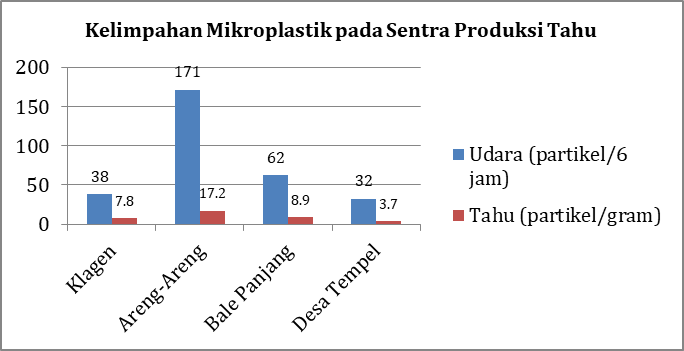The action on May 19, 2025, was carried out by AKAMSI (Alliance of Riverbank Community Rescuers), consisting of the Ecological and Wetlands Conservation Study Institute (Ecoton), Aksi Biroe, and Surabaya River Revolution. They brought posters urging and informing the public to stop using plastic as fuel, following findings of microplastics in the air and particulate matter (PM2.5 and PM10) levels exceeding ambient air quality standards. The action, held at the Sidoarjo Regency Square, highlighted the tofu production process at Tropodo Village tofu factories, which primarily use plastic waste as fuel.
“Plastic is very difficult to decompose, but burning it is a false solution that creates new problems, such as dioxin and microplastics spreading in the air and entering our respiratory systems. Therefore, collaboration from all parties is necessary to address this plastic issue,” said Kaka Callista, a student at Brawijaya University.
The campaign in front of Sidoarjo Square featured participants dressed in black and carrying posters stating "Stop Imported Waste," "Stop Burning Plastic Waste," and caricatures depicting the threats of dioxin and microplastics to chickens in Tropodo.
This action was triggered by:
-
Microplastic Contamination in the Air of Six Villages in Sidoarjo
The AKAMSI team found microplastics in the air of six areas in Sidoarjo: Tropodo Village, Wonoayu District, Waru District, Sepanjang District, Sukodono District, and Sidoarjo Square. Types identified include fibers, fragments, and filaments. A total of 172 microplastic particles were found in these areas. In the tofu factory area of Tropodo Village itself, 13 fibers and 12 filaments were detected. The highest concentration was found in Wonoayu District, approximately 3 km from Tropodo Village, with 65 particles per 3 hours.
-
60% of Fuel in Tropodo Tofu Factories is Imported Plastic Waste
Plastic waste is used as the main fuel in the tofu production process at Tropodo Village tofu factories. This is due to the low price of plastic waste compared to wood, allowing for higher production profits. The composition of plastic waste used is dominated by 40% imported plastic scrap, 20% rubber, shoe soles, and Styrofoam, 10% sachet plastic, 20% wood, and 20% coconut shells. The imported plastic waste comes from paper recycling factories in Mojokerto and Pasuruan, originating from the United States, South Korea, France, Italy, Australia, and the Netherlands. The Indonesian government banned the use of imported plastic waste as fuel in 2019; however, it is still used in tofu production as of 2025. -
Air Quality Exceeds Standards
Measurements of PM2.5 and PM10 showed values of 690 μg/m³ and 820 μg/m³ respectively, exceeding the ambient air quality standards. These concentrations appear black in color, indicating hazardous conditions. Ambient Air Quality Standards (Government Regulation No. 22 of 2021, Annex VII)
Testing Time
Sample Location (Sub Village, Village)
Paremeter
Ambient Air Quality Standards (Government Regulation No. 22 of 2021, Annex VII)
PM 2.5
PM 10
14 Juli 2023
Areng-Areng, Tropodo
302 µg/m³
-
PM 2.5 = 55 µg/m³
PM 10 = 75 µg/m³
14 Juli 2023
Klagen, Tropodo
224 µg/m³
-
14 Juli 2025
Balepanjang, Tropodo
153 µg/m³
-
7 Mei 2025
Wonoayu, Wonoayu
(3 Km from Tropodo)
93 µg/m³
127 µg/m³
7 Mei 2025
Areng-Areng, Tropodo
690 µg/m³
812 µg/m³
7 Mei 2025
Areng-Areng, Tropodo
1349 µg/m³
1500 µg/m³
17 Mei 2025
Areng-Areng, Tropodo
1063 µg/m³
1401µg/m³
Dioxin Contamination Found in Tropodo Chicken Eggs
Tropodo Village in Krian District, Sidoarjo Regency, East Java, has become a public concern due to air pollution. Since 1984, 51 home-based tofu industries have been using imported plastic waste as fuel instead of wood to reduce production costs. This practice releases harmful compounds such as dioxin and furan, which are known to cause hormonal disorders, cancer, and respiratory diseases. In 2019, the International POPs Elimination Network (IPEN) revealed extremely high dioxin levels in free-range chicken eggs around Tropodo, reported as the second highest in Asia—70 times higher than the European Food Safety Authority (EFSA) standard.
Ecoton’s 2023 research has shown microplastic contamination in the air. Air pollution from microplastics is now a real threat to human health, especially due to burning plastic waste at low temperatures. This process also produces carcinogenic compounds such as dioxin and furan. The impacts of dioxin and microplastics include:
-
Disruption of the human hormonal and immune systems.
-
Lung health issues: Microplastics can be inhaled, accumulate in respiratory tracts, causing irritation, inflammation, and chronic lung disorders.
-
Increased Acute Respiratory Infection (ARI) cases: Research by M.A. Fauzi (2023) found microplastics and PM2.5 particles in the Tropodo tofu industrial area correlated with rising ARI cases, as confirmed by Sidoarjo Health Department Head Syaf Satriawarman.
-
Respiratory disorders: Microplastics can enter the bloodstream and spread to vital organs, including the brain and placenta, potentially causing oxidative stress, tissue damage, and metabolic disorders. Microplastics also absorb toxic chemicals, increasing health risks.
We, AKAMSI, will fight to protect the health of the people of Sidoarjo. Therefore, we demand the Sidoarjo Regency Government, the Government of the Republic of Indonesia, and the 51 Tropodo Tofu Producers to:
-
Stop the practice of burning plastic as fuel in all forms throughout Sidoarjo Regency, especially in Tropodo Village.
-
Declare Tropodo a Dioxin Air Pollution Emergency Area.
-
Install air monitoring devices as part of strict supervision and law enforcement against tofu industries in Tropodo that use plastic waste as fuel.
-
Promote sorted waste management without incineration.
-
Provide incentives for stoves using wood fuel.
Immediate action is needed for a healthier future and a cleaner environment.





Tidak ada komentar:
Posting Komentar